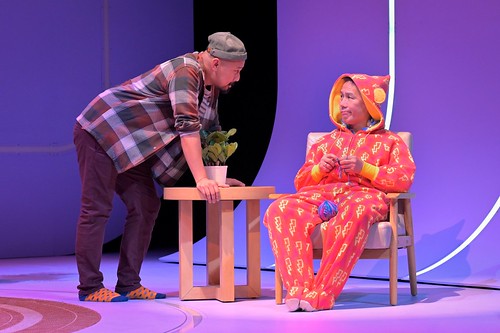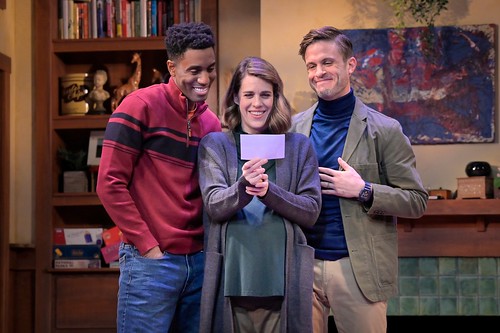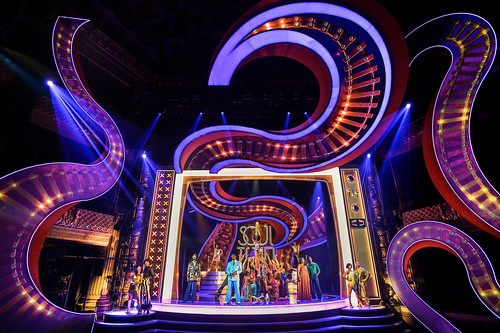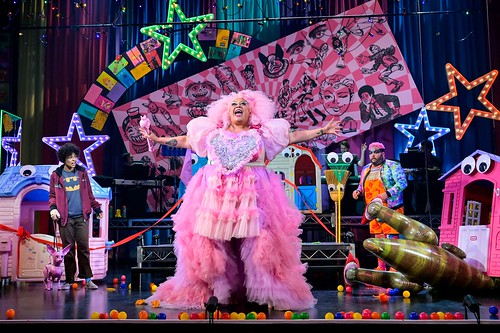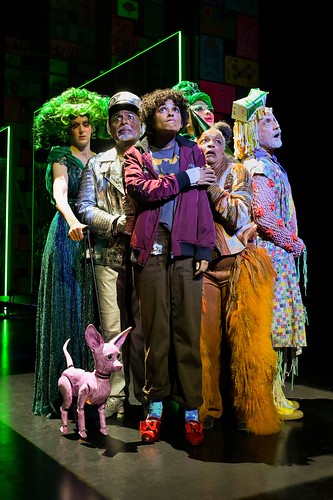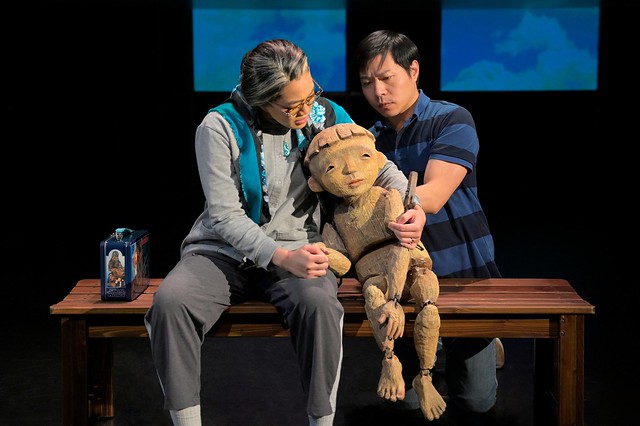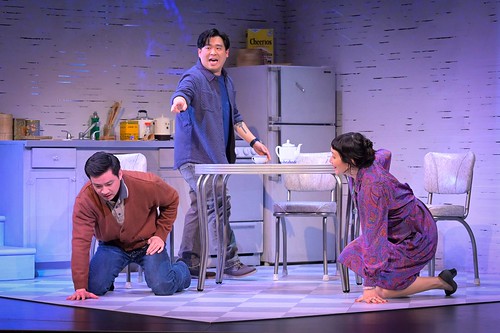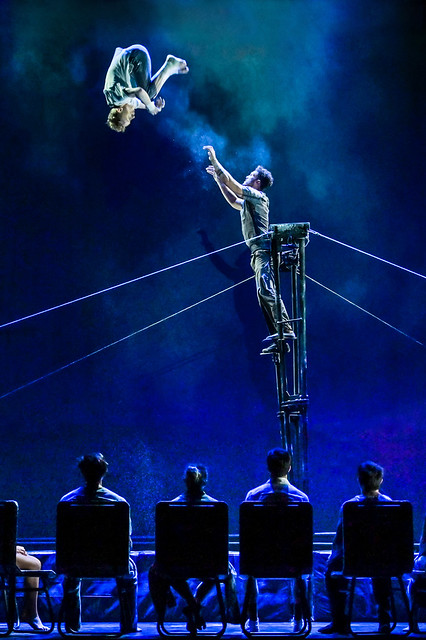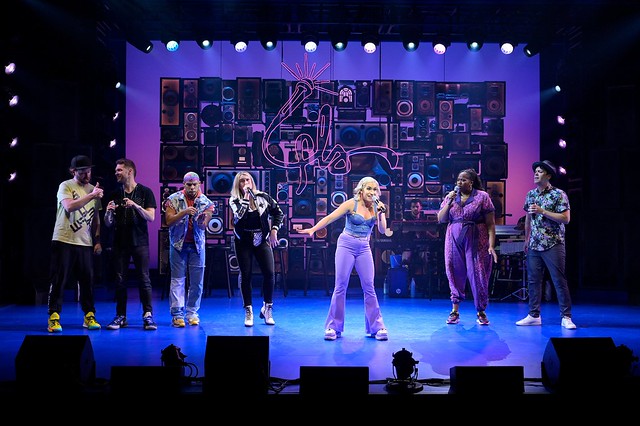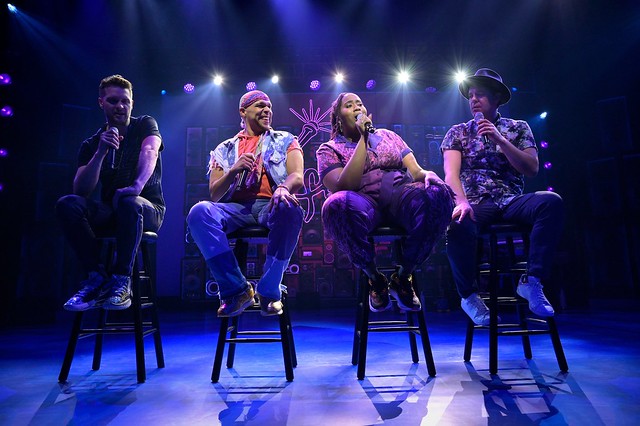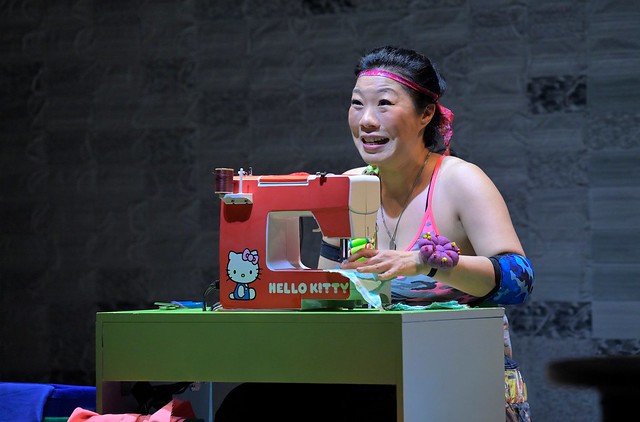
(Above and Below) Kristina Wong’s award–winning solo show, Kristina Wong, Sweatshop Overlord, at ACT’s Strand Theater through May 5, tells the story of the pandemic through her experience of building a community to make masks. Photos by Kevin Berne
If you have to re-live the horrors of the pandemic, there’s no better companion to do it with than Kristina Wong, the author and star of the dynamic, dazzling and deeply moving solo show Kristina Wong, Sweatshop Overlord, now at American Conservatory Theater’s Strand Theater.
On a stage filled with giant pin cushion tomatoes, parcels made out of cloth and other warped fairy tale representations of Wong’s Los Angeles Korea Town apartment, we are taken back to March 2020, when the world changed. Wong begins the show before she begins the show with a little prologue to ease us into the right frame of mind. She jokingly offers a trigger warning because she’s going to talk about the pandemic, death, racism, “the last president” and other horrific things. Of course she gets a laugh, but she knows what she’s doing (she has, after all, been performing this show since 2021). This show really is a trigger, and it all comes flooding back.
It’s a fascinating aspect of good storytelling that by focusing in on very specific details of a very specific story, you also open the window onto a much larger narrative. In this case, the specifics involve Wong, a busy performance artist, whose calendar and livelihood have suddenly evaporated with California’s shelter-in-place orders. Fairly quickly, she takes the Hello, Kitty sewing machine on which she used to make props and costumes for her shows and begins sewing masks for the likes of firefighters and healthcare workers whose employers can’t provide enough PPE (just hearing the acronym for “personal protective equipment” again made me shrink into my chair).
Through word of mouth and social media, Wong soon has more orders than she can fulfill, so she harnesses the power of Facebook to create a network of sewers, which she calls Auntie Sewing Squad (A.S.S.), and she is lovingly dubbed the “sweatshop overlord.” The sewers are mostly women, many of Asian descent and all wanting to contribute and feel useful in what often felt like a hopeless and overwhelming time.
In a time of rampant government failure on so many fronts, these Aunties created a community that not only provided essential products for people who needed them most, but also found ways to care for and sustain each other through illness, death, fear and relentless stress.
Wong is such an vigorous, personable storyteller that her humor keeps the 100-minute show bouncing along while the emotional weight of it builds steadily under all the bright colors and abundant laughs. Credit also has to go to director Chay Yew for helping create a show that is as moving as it is funny.
Wong takes us through all of it, including the murders of George Floyd and Breonna Taylor and the rise of the Black Lives Matter Movement; the horrifying rise of violence directed at Asian communities; the eruption of anti-maskers and the obliteration of any hope that this international crisis would bring humanity together; and then the election and the January 6 riots. All the while, we re-experience this through the lens of Wong and her Aunties staying strong, productive and loving (at least of one another).
It’s a lot to be sure, but while we shudder once again through the worst of humanity, Wong keeps a light on the best of us – when we’re together and actively (and respectfully and generously) engaged in community, in action and in hope.
We’re going to be parsing the last four years in lots of ways for many years to come because it still doesn’t all make sense, and it’s too big to fully comprehend. That’s why Kristina Wong, Sweatshop Overlord is more than just a wonderful solo show by a gifted writer/performer. It’s also a vital chapter of an epic story we’re still writing.
FOR MORE INFORMATION
Kristina Wong, Sweatshop Overlord continues through May 5 at ACT’s Strand Theater, 1127 Market St., San Francisco. Run time: 100 minutes. Tickets are $25-$130 (subject to change). Call 415-749-2228 or visit act-sf.org.


